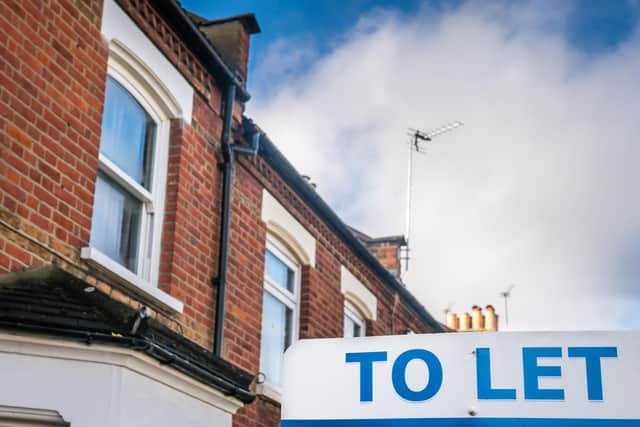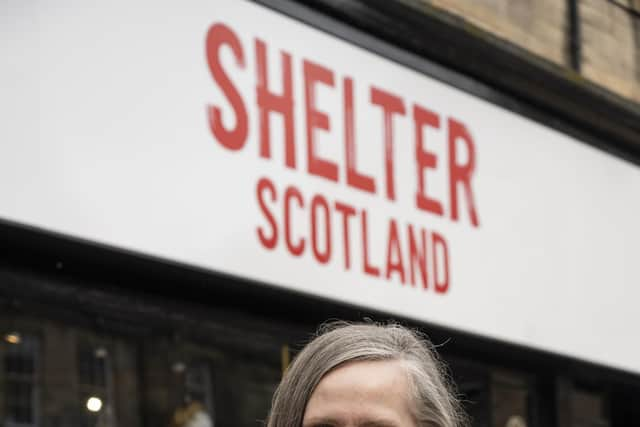Falkirk landlord warns of crisis as rents have gone up 40 per cent in three years
and live on Freeview channel 276
As rents in Falkirk have shot up by around 40 per cent in the last three years, more and more people are finding themselves homeless or in unsuitable accommodation.
The Scottish Government’s Cost of Living (Tenant Protection) Scotland act is temporary legislation that was introduced last April “to protect tenants in response to exceptional economic circumstances”.
Advertisement
Hide AdAdvertisement
Hide AdIt means private landlords cannot raise rents for sitting tenants by more three per cent – or six per cent if they can prove that hardship is being caused.


The legislation is reviewed every six months and it is expected to be renewed in September until March 2024.
But David Aiton, founder of the Falkirk Landord Alliance and owner of Sinclair Services, which manages rental properties in Forth Valley, says the act is making landlords think twice about investing in areas like Falkirk – and that, he says, is “disastrous” for private tenants too.
Mr Aiton said: “It is forcing landlords to sell their properties and invest elsewhere. One of our primary landlord clients has reduced his portfolio from 48 to 35 properties, all because of the hostile nature of the legislation.
Advertisement
Hide AdAdvertisement
Hide Ad“In Falkirk, the number of registered private landlords has reduced from a peak of over 5000 to 4700 in recent months.


“As a consequence, the number of affordable private rental properties in Falkirk and elsewhere is being considerably reduced.
“We are getting calls on a daily basis from desperate home seekers. We cannot help them because of the drastic reduction in affordable rental housing which this legislation has caused.”
Mr Aiton highlights a recent report by the Society of Local Authority Chief Executives (SOLACE), on the housing crisis that is now facing Scotland.
Advertisement
Hide AdAdvertisement
Hide AdWhile it’s a complex picture – with private lets just one aspect – the report does seem to support Mr Aiton’s belief that the Scottish Government legislation is making the situation worse.
It states: “We recommend the lifting of the Cost of Living (Tenant Protection) Scotland act; the evidence demonstrates that it has not done what it set out to do and instead is impacting on investment.”
Mr Aiton says the impact on the local rental market is already clear, pointing to a current listing for one-bedroom flat in Falkirk being offered for £625 pcm.
“A flat like that will be around £350 for a sitting tenant,” he said. “The legislation is not protecting tenants in the long-term.”
Advertisement
Hide AdAdvertisement
Hide AdOther houses that would have been £500 to rent three years ago are now being offered for £750.
Estate agent Clark Gillespie, director of Clyde Properties, agrees that there is a trend of landlords selling up, although he says a number of factors are playing a part.
“Landlords in the private rental sector are having a terribly difficult time as a result of political interference,” he said.
In recent years, he added, landlords have been hit with a string of charges and tax increases that are making many people decide the investment is “not worth the hassle”.
Advertisement
Hide AdAdvertisement
Hide AdHe agrees with Mr Aiton that the cap on private rent increases is having a big impact, at a time when mortgage rates have been rising rapidly, leaving some landlords out of pocket.
Falkirk Council figures show the number of private rented properties available for rent in the area has decreased by just 0.5 per cent over the past 12 months from 6330 properties to 6298 – but Mr Aiton said it will take a while for the figures to catch up with the reality.
The council figures do, however, show an increase in homelessness. A spokesperson said: “We have seen an increase in homeless applications in 2022/23 to 1201 (from 1143 in 2021/22).
“However we know that this is not just in the Falkirk area and is reflected nationally driven by various factors including the cost of living.”
Advertisement
Hide AdAdvertisement
Hide AdMr Aiton believes its vital that the legislation is not renewed for another six months and he is eagerly waiting for the result of a judicial review that is challenging the act.
He said: “The destruction needs to stop and the legislation needs to be terminated as of September 30, whilst we still have a private rental sector in Scotland.”
A Scottish Government spokesperson said: “Our temporary emergency legislation was introduced to protect tenants in response to exceptional economic circumstances.
“Since April, landlords have been able to increase rents by three per cent or six per cent in specified circumstances, and the rent cap and additional evictions protections can only be in place until March 2024 at the latest, if approved by Parliament.
Advertisement
Hide AdAdvertisement
Hide Ad“We believe that a well-regulated private rented sector is good for landlords and tenants and can be attractive to investors.”
The charity Shelter says the only answer to the housing crisis is more social housing on a massive scale.
Shelter Scotland director, Alison Watson, said: “Scotland is in a housing emergency, which has been driven by decades of underinvestment in social housing and compounded by the current cost of living crisis.
“When the Scottish Government first introduced its emergency legislation we welcomed efforts to stop people losing their home but we also made two things clear; the regulations had to protect those most at risk of homelessness, and the new laws would do nothing for the thousands of people who had already become homeless.
Advertisement
Hide AdAdvertisement
Hide Ad“Scotland desperately needs more social housing; that’s the only thing that will deliver the kind of significant change our broken housing system requires.
“Until the Scottish Government recognises that, and steps up to deliver the social homes, the housing emergency will continue to deteriorate”